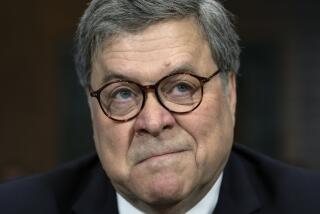‘Secret’ CIA memo on WikiLeaks is not very revelatory
- Share via
Reporting from Washington — The latest U.S. government document posted by WikiLeaks is marked “secret,” but it contains no new revelations, startling or otherwise.
It’s a CIA memo that reads like the musings of a Washington think tank, pondering what might happen if the United States began to be perceived as an “exporter of terrorism,” as a result of attacks mounted abroad by homegrown radicals. The conclusion: It would not be a good thing.
WikiLeaks won fame and notoriety after releasing gun-camera video of a U.S. helicopter attack in Iraq, and more recently about 75,000 classified military documents detailing operations in Afghanistan.
The CIA report posted by WikiLeaks on Wednesday is something more mundane. It was written by the CIA’s Red Cell, a unit created after the 9/11 attacks to offer “out-of-the-box” thinking and “produce memos intended to provoke thought rather than to provide authoritative assessment,” according to the agency’s website.
The memo, dated February, notes the increasing threat that domestic radicals are posing to the U.S. homeland. It ponders what would happen if American residents or citizens began mounting terrorist attacks abroad.
“Much attention has been paid recently to the increasing occurrence of American-grown Islamic terrorists conducting attacks against U.S. targets, primarily in the homeland,” the memo says. “Less attention has been paid to homegrown terrorism, not exclusively Muslim terrorists, exported overseas to target non-U.S. persons.”
It adds: “Contrary to common belief, the American export of terrorism or terrorists is not a recent phenomenon, nor has it been associated only with Islamic radicals or people of Middle Eastern, African or South Asian ethnic origin. This dynamic belies the American belief that our free, open and integrated multicultural society lessens the allure of radicalism and terrorism for U.S. citizens.”
For example, it says, Pakistani American David Headley conducted surveillance in November 2008 to support a terrorist attack in Mumbai, India. And Irish Americans long supported the Irish Republican Army as it conducted bombings in Britain.
If the U.S. were seen as an “exporter of terrorism,” foreign governments may be less willing to cooperate in what has become an important CIA tool after 9/11, the memo says: “detention, transfer and interrogation of suspects in third-party countries.”
In extreme cases, foreign governments could mount intelligence operations on U.S. soil targeting extremists, the memo says.
It’s difficult to imagine another country pursuing extremists with more fervor than the U.S., which kills insurgents on a regular basis with missiles from unmanned aircraft over Pakistan. But the U.S. does harbor people whom other countries consider enemies, such as Rebiya Kadeer, a Uighur businesswoman whom the Chinese government accused last year — wrongly, she says — of inciting deadly riots. She lives in Virginia.
The CIA memo does not address how the U.S. would respond if China attempted the sort of action against Kadeer that the U.S. routinely takes in Pakistan against those it considers a threat.
ken.dilanian@latimes.com
More to Read
Sign up for Essential California
The most important California stories and recommendations in your inbox every morning.
You may occasionally receive promotional content from the Los Angeles Times.














